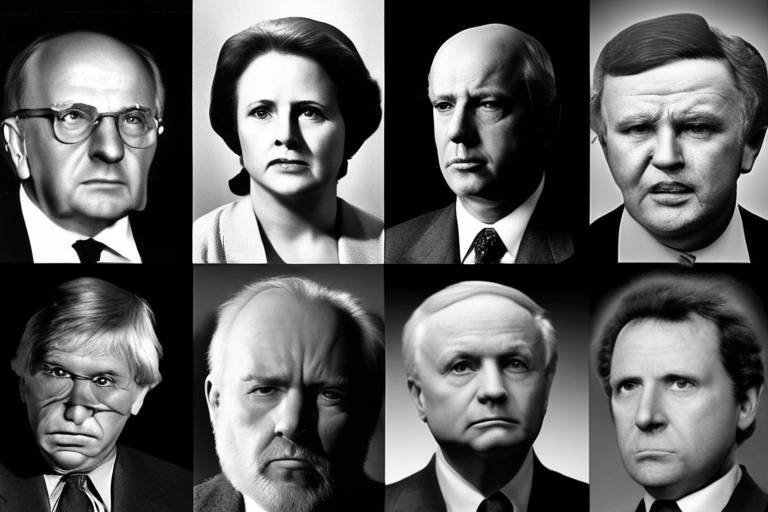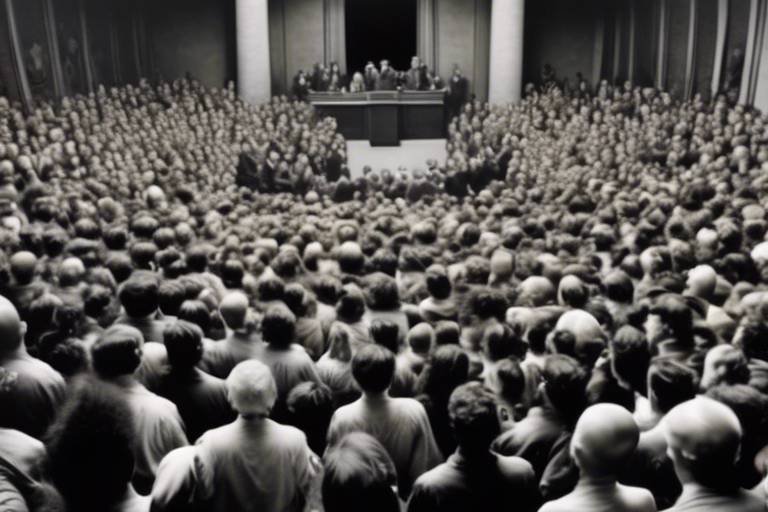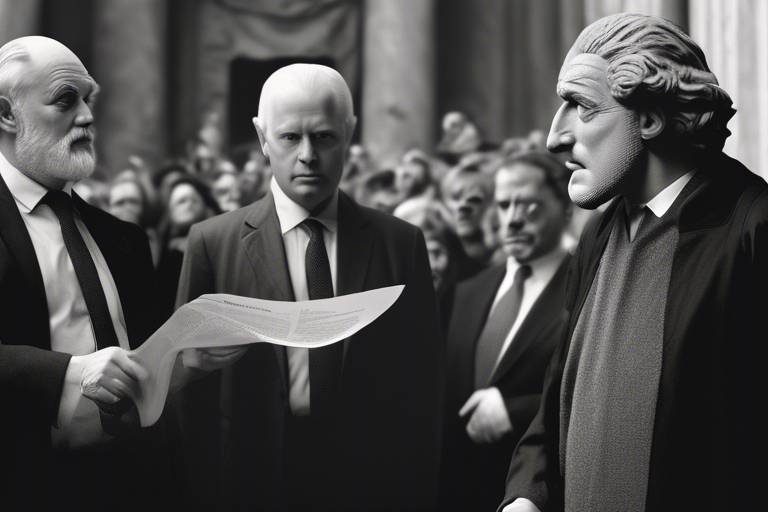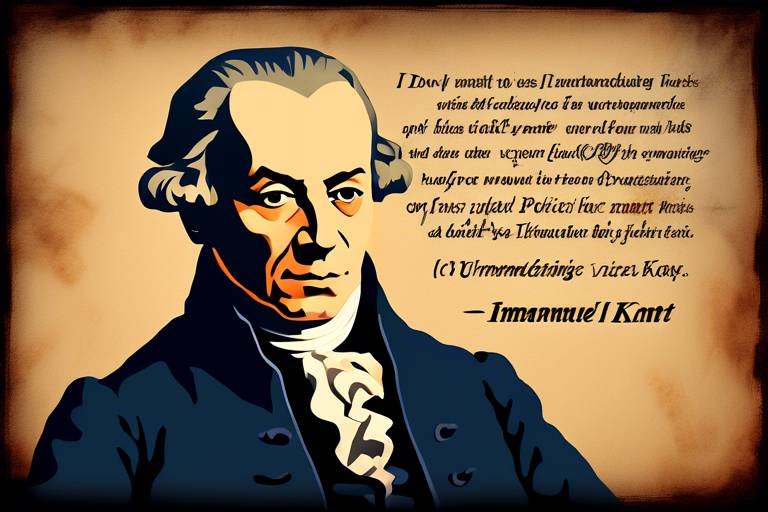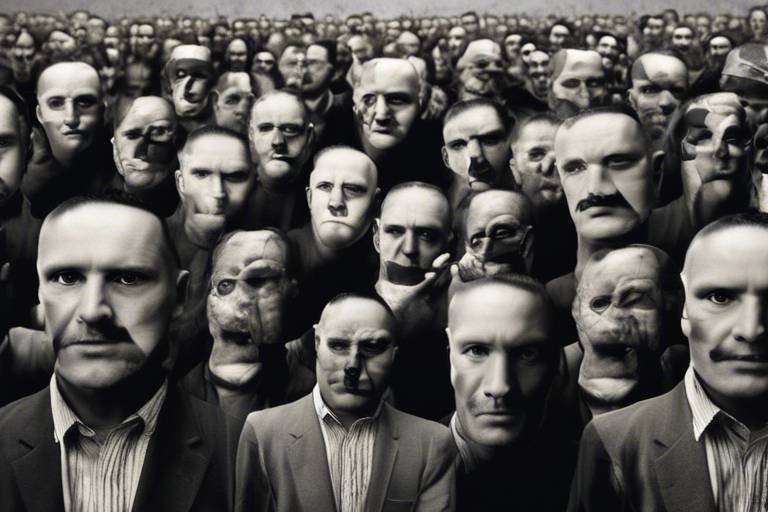The Philosophy of Civil Rights Politics in America
This article explores the foundational philosophies that shape civil rights politics in America, examining historical contexts, key figures, and ongoing debates that influence contemporary civil rights movements.
Understanding the historical backdrop of civil rights in America is essential. This section delves into significant events and milestones that have shaped the current landscape of civil rights politics. From the abolition of slavery to the Civil Rights Act of 1964, each event has played a pivotal role in molding the discourse surrounding civil rights. The fight for equality has not been linear; it has been a tumultuous journey filled with victories and setbacks. For instance, the landmark Supreme Court case Brown v. Board of Education in 1954 declared racial segregation in public schools unconstitutional, setting a precedent that would echo through the civil rights movement. However, challenges persist, as seen in the ongoing debates over voter ID laws and gerrymandering, which disproportionately affect marginalized communities.
This section highlights the major philosophical influences on civil rights movements, including Enlightenment thinkers and social justice advocates who have impacted American political thought and action. The Enlightenment period, with its emphasis on reason and individual rights, introduced ideas that would later be foundational to civil rights. Thinkers like John Locke championed the notion of natural rights, arguing that every individual is entitled to life, liberty, and property. These ideas not only fueled revolutions but also laid the groundwork for the civil rights movements that followed.
Exploring how Enlightenment ideals of liberty, equality, and fraternity laid the groundwork for civil rights philosophy, this section discusses their relevance in shaping modern political discourse. The essence of these ideals can be seen in the Declaration of Independence, where the phrase "all men are created equal" became a rallying cry for generations. However, the application of these principles has often been selective, prompting civil rights leaders to challenge the status quo and demand that these ideals be extended to all individuals, regardless of race, gender, or socioeconomic status.
This subsection examines how social contract theory has influenced civil rights, providing a framework for understanding the relationship between individuals and the state in terms of rights and responsibilities. Thinkers like Rousseau and Hobbes posited that individuals consent to surrender some freedoms in exchange for protection and order from the state. This idea raises critical questions: What happens when the state fails to protect its citizens? When does the social contract become void? These questions are central to civil rights discussions, as activists argue for the restoration of rights that have been undermined by systemic injustices.
Analyzing the role of utilitarianism in civil rights politics, this section discusses how the greatest good for the greatest number can sometimes conflict with individual rights. While utilitarianism seeks to maximize overall happiness, it can inadvertently justify the oppression of minority groups. For example, policies that benefit the majority at the expense of marginalized communities challenge the very fabric of justice. This philosophical tension continues to provoke debate among activists and policymakers, as they strive to balance collective well-being with the protection of individual rights.
This section discusses how various religious philosophies have contributed to civil rights discourse, emphasizing the moral imperative for justice and equality in American society. Many civil rights leaders, including Martin Luther King Jr., drew upon their religious beliefs to advocate for social change. They argued that justice is not merely a legal issue but a moral one, rooted in the teachings of love, compassion, and equality found in many religious traditions. This spiritual dimension adds depth to the civil rights movement, reminding us that the fight for justice is also a fight for the soul of humanity.
Focusing on current civil rights movements, this section examines how philosophical foundations continue to influence activism and policy-making in contemporary America. Today, movements like Black Lives Matter and LGBTQ+ rights advocacy are at the forefront of the civil rights landscape, utilizing both traditional and modern strategies to promote their causes. The philosophical underpinnings of these movements reflect a commitment to intersectionality, recognizing that various forms of oppression are interconnected and must be addressed collectively.
This subsection explores the concept of intersectionality, emphasizing how overlapping social identities impact individuals' experiences and the broader civil rights agenda. Coined by Kimberlé Crenshaw, intersectionality highlights that individuals do not experience discrimination in isolation but rather through a complex interplay of race, gender, class, and other identities. This understanding has transformed civil rights activism, pushing for a more inclusive approach that recognizes the unique challenges faced by those at the intersections of multiple marginalized identities.
Analyzing the rise of digital activism, this section discusses how online platforms have transformed civil rights movements, allowing for new philosophical approaches and strategies for advocacy. Social media has become a powerful tool for organizing, mobilizing, and raising awareness. Hashtags like #MeToo and #BlackLivesMatter have not only sparked global conversations but have also challenged traditional narratives about civil rights. Digital activism democratizes the process, enabling diverse voices to contribute to the ongoing discourse and reshape the landscape of civil rights in real-time.
- What are civil rights? Civil rights are the rights of individuals to receive equal treatment and protection under the law, regardless of race, gender, or other characteristics.
- Why is the history of civil rights important? Understanding the history of civil rights helps us recognize the struggles and achievements that have shaped contemporary society and informs ongoing efforts for equality.
- How do philosophical ideas influence civil rights movements? Philosophical ideas provide the foundational principles that guide civil rights movements, shaping their goals, strategies, and ethical considerations.
- What role does intersectionality play in civil rights? Intersectionality emphasizes that individuals experience multiple forms of discrimination simultaneously, necessitating a more nuanced approach to addressing civil rights issues.

The Historical Context of Civil Rights
Understanding the historical backdrop of civil rights in America is essential for grasping the complexities of the current landscape. The journey toward civil rights has been a tumultuous one, filled with significant events that have shaped the nation’s conscience. From the abolition of slavery to the Civil Rights Movement of the 1960s, each milestone has carved a path toward greater equality and justice.
One of the earliest and most pivotal moments was the Emancipation Proclamation in 1863, which declared the freedom of slaves in Confederate states. This act was not merely a legal decree; it was a profound shift in the moral fabric of the nation. However, the end of slavery did not equate to the end of discrimination. The subsequent era of Reconstruction saw both progress and backlash, with the establishment of the 13th, 14th, and 15th Amendments aimed at securing rights for African Americans. Yet, the rise of Jim Crow laws and systemic racism stifled these advancements, leading to a century of struggle.
Fast forward to the mid-20th century, and we encounter the Civil Rights Movement, a significant turning point in American history. This era was marked by powerful figures such as Martin Luther King Jr., Rosa Parks, and Malcolm X, who galvanized the nation to confront its racial injustices. The movement was characterized by peaceful protests, sit-ins, and marches, culminating in landmark legislation like the Civil Rights Act of 1964 and the Voting Rights Act of 1965. These laws were monumental, as they aimed to dismantle institutional racism and provide legal protections for all citizens.
Yet, the fight for civil rights did not end with these legislative victories. The historical context of civil rights is a continuous narrative, marked by ongoing struggles against inequality. In recent years, movements such as Black Lives Matter have emerged, highlighting the persistent issues of police brutality and systemic racism. This resurgence of activism serves as a reminder that the quest for equality is far from over.
To better understand the evolution of civil rights, it’s helpful to examine key events and their impacts in a tabular format:
| Year | Event | Impact |
|---|---|---|
| 1863 | Emancipation Proclamation | Declared freedom for slaves in Confederate states. |
| 1964 | Civil Rights Act | Outlawed discrimination based on race, color, religion, sex, or national origin. |
| 1965 | Voting Rights Act | Prohibited racial discrimination in voting. |
| 2013 | Black Lives Matter Movement | Focus on systemic racism and police brutality. |
This historical context not only highlights the struggles faced by marginalized communities but also emphasizes the resilience and determination of those who fought for their rights. The fight for civil rights is deeply woven into the American identity, reminding us that the pursuit of justice and equality is an ongoing endeavor. As we reflect on these events, we must ask ourselves: what lessons can we learn from the past to inform our actions today?

Key Philosophical Influences
The landscape of civil rights politics in America is not just shaped by laws and regulations; it is deeply rooted in philosophical thought. Understanding these gives us insight into the motivations and frameworks that drive civil rights movements. From the Enlightenment thinkers who championed liberty and equality to social justice advocates who continue to push for reform, these ideas have been pivotal in shaping the dialogue around civil rights. Let's delve into some of these major philosophical influences that have left an indelible mark on American political thought and action.
The Enlightenment period was a time of great intellectual upheaval, where ideas about liberty, equality, and fraternity began to take root. Thinkers like John Locke and Jean-Jacques Rousseau proposed that individuals are born with certain inalienable rights, which laid the groundwork for civil rights philosophy. These ideas resonate today, as they remind us that the fight for civil rights is fundamentally about recognizing and protecting the inherent dignity and worth of every individual. Imagine a world where everyone has a seat at the table, where voices that have long been silenced are finally heard. That is the vision that Enlightenment ideals inspire.
One of the most critical contributions from Enlightenment thinkers is the concept of social contract theory. This theory posits that individuals consent, either explicitly or implicitly, to form a society and abide by its rules in exchange for protection and the benefits of communal living. In terms of civil rights, this framework helps us understand the relationship between the individual and the state. It raises essential questions: What obligations does the state have to its citizens? And conversely, what responsibilities do individuals have to uphold the rights of others? This reciprocal relationship is crucial in advocating for civil rights, as it emphasizes that the government must protect the rights of all, not just a privileged few.
Another philosophical influence that cannot be overlooked is utilitarianism, which argues that the best action is the one that maximizes overall happiness. While this may seem straightforward, it introduces complexities in civil rights politics. For instance, the idea of "the greatest good for the greatest number" can sometimes conflict with the rights of individuals or minority groups. This tension raises important ethical questions: Should the needs of the majority always take precedence? In the pursuit of justice, we must navigate these murky waters, ensuring that the rights of all individuals are respected and upheld, even if it means challenging the status quo.
Religious philosophies have also played a significant role in shaping civil rights discourse in America. Many religious traditions advocate for justice and equality, emphasizing a moral imperative to care for the marginalized and oppressed. Figures like Martin Luther King Jr. drew heavily from Christian teachings, advocating for nonviolent resistance and love as powerful tools in the struggle for civil rights. The intersection of faith and activism creates a compelling narrative that not only inspires individuals but also mobilizes communities to demand change. It’s a reminder that the fight for civil rights is not just a political battle; it is also a deeply moral one.
In conclusion, the philosophical influences on civil rights politics in America are profound and multifaceted. Enlightenment ideals, social contract theory, utilitarianism, and religious thought all contribute to the ongoing dialogue about rights, justice, and equality. As we continue to engage with these philosophies, we must remain vigilant in our pursuit of a society that honors the dignity of every individual.
- What are the key philosophical influences on civil rights? The key influences include Enlightenment ideals, social contract theory, utilitarianism, and various religious philosophies.
- How do Enlightenment ideals impact modern civil rights movements? Enlightenment ideals emphasize liberty and equality, which are foundational to contemporary civil rights discussions.
- What is social contract theory? Social contract theory posits that individuals consent to form a society and abide by its rules in exchange for protection and benefits.
- How does utilitarianism relate to civil rights? Utilitarianism focuses on the greatest good for the greatest number, which can sometimes conflict with individual rights.
- What role does religion play in civil rights? Religious philosophies often advocate for justice and equality, influencing many civil rights leaders and movements.

Enlightenment Ideals
The Enlightenment, often referred to as the Age of Reason, was a pivotal era that profoundly influenced the philosophical underpinnings of civil rights in America. Thinkers like John Locke, Jean-Jacques Rousseau, and Voltaire championed ideas that emphasized individual liberty, equality, and the inherent dignity of all human beings. These Enlightenment ideals laid the groundwork for the belief that every individual is entitled to fundamental rights, regardless of their social status, race, or background. Imagine a world where every person is seen as a unique thread in the vast tapestry of humanity, each deserving of respect and recognition. This vision was not merely a philosophical abstraction; it became a rallying cry for those seeking justice and equality.
At the heart of Enlightenment thought is the concept of natural rights. Locke famously argued that life, liberty, and property are inalienable rights that cannot be justly taken away without consent. This idea resonated deeply during the American Revolution, as the colonists sought to break free from oppressive British rule. The Declaration of Independence echoes this sentiment, stating that all men are created equal and endowed with certain unalienable rights. It's fascinating to see how these Enlightenment principles have been woven into the very fabric of American democracy, influencing not only the founding documents but also the ongoing struggle for civil rights.
Moreover, the Enlightenment introduced the notion of social contract theory, which posits that individuals consent, either explicitly or implicitly, to form a society and be governed by its rules. This idea emphasizes the mutual responsibilities between citizens and their government. In essence, it suggests that the state exists to protect the rights of its citizens, and when it fails to do so, the people have the right to revolt. This revolutionary concept has inspired countless movements throughout history, from the abolition of slavery to the modern fight for LGBTQ+ rights. It serves as a reminder that the pursuit of justice is not just a personal endeavor but a collective responsibility.
Utilitarianism, another philosophical influence from the Enlightenment, adds another layer to our understanding of civil rights. This ethical theory, popularized by thinkers like Jeremy Bentham and John Stuart Mill, argues that actions are right if they promote the greatest happiness for the greatest number. While this principle has its merits, it can sometimes clash with individual rights. For instance, in the pursuit of the greater good, the rights of minority groups may be overlooked or trampled upon. This tension highlights the complexities of civil rights politics, reminding us that while we strive for collective well-being, we must never forget the importance of protecting the rights of every individual.
In summary, the Enlightenment provided a rich philosophical foundation for civil rights politics in America. Its ideals of liberty, equality, and the social contract continue to resonate in contemporary debates about justice and human rights. As we navigate the complexities of modern society, it is essential to reflect on these Enlightenment principles, ensuring that they remain central to our ongoing quest for a more equitable world. Just as a compass guides a traveler, these ideals can help steer us toward a future where justice and equality are not just aspirations, but realities for everyone.
- What are Enlightenment ideals? Enlightenment ideals refer to the principles of liberty, equality, and individual rights that emerged during the Enlightenment period, significantly influencing modern democratic thought.
- How did Enlightenment thinkers influence civil rights? Thinkers like Locke and Rousseau emphasized natural rights and social contracts, which laid the philosophical groundwork for civil rights movements in America.
- What is social contract theory? Social contract theory posits that individuals consent to form societies and be governed, highlighting the mutual responsibilities between citizens and their government.
- How does utilitarianism relate to civil rights? Utilitarianism advocates for the greatest happiness for the greatest number, but it can sometimes conflict with the rights of individuals, especially minorities.

Social Contract Theory
Social contract theory is one of those fascinating ideas that really makes you think about the nature of society and the role of government. At its core, this theory posits that individuals come together to form a society and agree, either explicitly or implicitly, to surrender some of their freedoms in exchange for protection and the benefits of collective living. Imagine it like a giant game of trade-off: you give up a little bit of your freedom, and in return, you gain security and order. This concept has been pivotal in shaping civil rights discussions in America, as it raises critical questions about the balance between individual rights and the authority of the state.
One of the major figures associated with social contract theory is John Locke. Locke argued that the government’s legitimacy comes from the consent of the governed. This means that if a government fails to protect the rights of its citizens, those citizens have the right to revolt. This idea laid the philosophical groundwork for many civil rights movements, as it emphasizes the importance of personal liberty and the right to challenge authority when it becomes oppressive. Locke's view can be summarized in a simple, yet powerful statement: “The end of law is not to abolish or restrain, but to preserve and enlarge freedom.”
In contrast, we have Thomas Hobbes, who had a more pessimistic view of human nature. Hobbes believed that in a state of nature, life would be “solitary, poor, nasty, brutish, and short.” Therefore, he argued that individuals need to surrender a lot of their freedoms to a powerful sovereign to maintain peace and security. While Hobbes’ perspective might seem too authoritarian for modern sensibilities, it raises an interesting debate about how much freedom we are willing to give up for the sake of safety. Are we willing to sacrifice some of our rights to ensure a more secure society? This question is at the heart of many contemporary civil rights discussions.
Furthermore, social contract theory also prompts us to consider the rights and responsibilities that come with citizenship. If we agree to live in a society governed by laws, what obligations do we have to one another? This is particularly relevant in discussions about social justice and equity. For example, if one group is disproportionately affected by laws or policies, does the social contract require us to address those disparities? This brings us to the concept of collective responsibility, where we must consider how our actions and societal structures impact others.
To better illustrate these concepts, let’s look at a simple table that summarizes the key differences between Locke’s and Hobbes’ views on the social contract:
| Philosopher | View on Human Nature | Government Role | Rights of Citizens |
|---|---|---|---|
| John Locke | Inherently good, capable of reason | Protect and preserve individual rights | Right to revolt against oppressive government |
| Thomas Hobbes | Inherently selfish and violent | Maintain order and security | Limited rights; surrender to sovereign |
In conclusion, social contract theory serves as a fundamental framework for understanding civil rights in America. It challenges us to think critically about the balance between our individual freedoms and the collective good. As we navigate the complexities of modern society, these philosophical discussions remind us of the ongoing struggle to uphold civil rights for all individuals, ensuring that our social contracts remain fair and just.
- What is social contract theory? Social contract theory is the philosophical idea that individuals consent, either explicitly or implicitly, to form a society and abide by its rules in exchange for protection and benefits.
- Who are the main philosophers associated with social contract theory? The main philosophers include John Locke, who advocated for natural rights and the right to revolt, and Thomas Hobbes, who emphasized the need for a strong government to maintain order.
- How does social contract theory relate to civil rights? It raises questions about the balance between individual rights and government authority, and it underscores the importance of protecting citizens' rights in a society.

Utilitarianism and Justice
Utilitarianism, a philosophical doctrine that emphasizes the greatest good for the greatest number, plays a pivotal role in shaping civil rights politics. At its core, this theory suggests that actions are right if they promote overall happiness and wrong if they produce the opposite. However, the application of utilitarian principles in the realm of civil rights raises complex questions about justice and individual rights. For instance, can the well-being of the majority justify the oppression of a minority? This is a fundamental dilemma that civil rights advocates often grapple with.
To illustrate, consider a hypothetical scenario where a government implements a policy that benefits a large segment of the population but severely restricts the rights of a small group. From a strict utilitarian perspective, the policy might be deemed acceptable because it maximizes overall happiness. Yet, this approach can lead to significant ethical concerns. It begs the question: at what point does the sacrifice of individual rights become unacceptable? This tension between collective welfare and individual justice is a critical point of contention in civil rights discussions.
Moreover, utilitarianism often clashes with the principles of justice that advocate for the protection of individual rights regardless of the majority's desires. The challenge lies in balancing these two competing ideologies. While utilitarianism seeks to achieve the best outcomes for society as a whole, it can inadvertently marginalize vulnerable populations. This is where the philosophy of justice steps in, emphasizing that every individual deserves to have their rights respected and protected, irrespective of the majority's happiness.
Utilitarianism also faces scrutiny when it comes to measuring happiness and suffering. Happiness is subjective, and what brings joy to one person may cause distress to another. This subjectivity complicates the utilitarian approach, as it becomes increasingly difficult to quantify and compare the experiences of different individuals. As a result, civil rights advocates often argue for a more nuanced understanding of justice that transcends mere calculations of utility.
In summary, while utilitarianism offers valuable insights into the pursuit of collective well-being, its application in civil rights politics necessitates careful consideration. The interplay between utilitarian principles and the moral imperatives of justice serves as a compelling reminder of the complexities inherent in the quest for equality. As we navigate the ongoing struggles for civil rights, it is essential to recognize that the fight for justice is not merely about maximizing happiness but also about ensuring that every individual's rights are upheld and respected.
- What is utilitarianism? Utilitarianism is a philosophical theory that posits that the best action is the one that maximizes overall happiness or utility.
- How does utilitarianism relate to civil rights? Utilitarianism can sometimes conflict with civil rights, as it may justify the infringement of individual rights for the sake of the greater good.
- What are the criticisms of utilitarianism in the context of justice? Critics argue that utilitarianism can overlook the rights of minorities and lead to ethical dilemmas when individual suffering is justified for collective happiness.
- Can utilitarianism and justice coexist? While they can coexist, finding a balance between promoting the greatest good and protecting individual rights is crucial for a fair society.

Influence of Religious Thought
The influence of religious thought on civil rights movements in America cannot be overstated. Throughout history, various religious philosophies have provided a moral framework that advocates for justice, equality, and human dignity. For many activists, their faith has been the driving force behind their commitment to civil rights, acting as both a source of inspiration and a guiding principle in their fight against oppression.
One of the most profound examples of this influence can be seen in the African American church, which has played a pivotal role in the civil rights movement. The church was not just a place of worship but also a community hub where individuals gathered to discuss social issues and mobilize for change. Leaders like Martin Luther King Jr. drew upon their Christian beliefs, emphasizing the importance of love, nonviolence, and forgiveness in the struggle for equality. His famous quote, "Injustice anywhere is a threat to justice everywhere," encapsulates the deep moral imperative rooted in religious thought that fueled the movement.
Moreover, various religious traditions have contributed to the discourse on civil rights by advocating for the inherent worth of every individual. For instance, the teachings of Judaism emphasize the concept of Tikkun Olam, which means "repairing the world." This idea encourages followers to engage in social justice efforts, reinforcing the belief that everyone has a role in creating a just society. Similarly, Islamic teachings promote justice and equality, urging believers to stand against oppression and support those who are marginalized.
It's also worth noting that religious thought has often served as a unifying force among diverse groups fighting for civil rights. During the civil rights era, interfaith coalitions emerged, bringing together individuals from various backgrounds to advocate for common goals. These collaborations highlighted the shared values of compassion and justice across different faiths, demonstrating that the fight for civil rights transcends religious boundaries.
However, the relationship between religion and civil rights is not without its complexities. While many religious groups have championed social justice, others have resisted change, often citing traditional beliefs as a reason to maintain the status quo. This tension can lead to conflicts within communities, as individuals grapple with how to reconcile their faith with the evolving demands of society. For example, debates over issues like marriage equality and reproductive rights showcase the ways in which religious beliefs can both inspire and hinder progress in civil rights.
In conclusion, the influence of religious thought on civil rights politics in America is multifaceted and deeply ingrained in the fabric of the nation. It serves as a reminder that the quest for justice is not solely a political endeavor but also a moral one. As we continue to navigate contemporary civil rights issues, the teachings of various faiths will likely remain a significant source of inspiration and guidance for activists and advocates alike.
- How has the African American church influenced civil rights?
The African American church has been a central hub for organizing and mobilizing civil rights efforts, with leaders like Martin Luther King Jr. drawing upon their faith to advocate for justice and equality. - What role do interfaith coalitions play in civil rights?
Interfaith coalitions unite individuals from diverse religious backgrounds to advocate for social justice, demonstrating shared values of compassion and equality. - Are there conflicts between religious beliefs and civil rights?
Yes, while many religious groups support civil rights, some resist change due to traditional beliefs, leading to tensions within communities regarding contemporary issues.

Contemporary Civil Rights Movements
In the vibrant tapestry of American society, the stand as a testament to the ongoing struggle for justice and equality. These movements are not just relics of the past; they are dynamic forces that continue to shape the political landscape today. As we delve into this topic, it's essential to recognize that the philosophies underpinning these movements are deeply rooted in historical contexts while also adapting to modern challenges.
One of the most significant aspects of contemporary civil rights activism is the concept of intersectionality. This term, coined by Kimberlé Crenshaw, highlights how various social identities—such as race, gender, sexuality, and class—intersect to create unique experiences of oppression and privilege. In today's world, activists are increasingly aware that a one-size-fits-all approach to civil rights can overlook the nuances of individual experiences. Thus, movements like Black Lives Matter and LGBTQ+ rights organizations emphasize the importance of recognizing these overlapping identities. They advocate for a more inclusive agenda that addresses the specific needs of diverse communities, ensuring that no one is left behind in the quest for equality.
Moreover, the rise of digital activism has transformed the landscape of civil rights movements. Social media platforms have become powerful tools for organizing, mobilizing, and raising awareness. Hashtags like #MeToo and #BlackLivesMatter have not only facilitated discussions around pressing social issues but have also galvanized millions to take action. These platforms allow activists to share their stories and experiences, creating a sense of community and solidarity that transcends geographical boundaries. The immediacy of digital communication enables rapid dissemination of information, making it easier for movements to respond to injustices as they occur.
However, this shift towards digital activism is not without its challenges. While online platforms provide a voice for many, they can also lead to echo chambers where only similar opinions are heard, potentially stifling constructive dialogue. Furthermore, the digital divide remains a significant barrier, as not everyone has equal access to technology. This disparity raises important questions about representation and equity within the movements themselves. As activists navigate these complexities, they must remain vigilant about inclusivity and strive to amplify marginalized voices.
In addition to these philosophical underpinnings, contemporary civil rights movements are influenced by a range of policy debates. From voting rights to police reform, the issues at the forefront of activism today reflect a broader struggle for systemic change. For example, the push for comprehensive immigration reform is intertwined with civil rights, as advocates argue for the humane treatment of immigrants and the protection of their rights. Similarly, discussions around healthcare access often intersect with racial and economic justice, highlighting the need for equitable solutions that benefit all members of society.
As we reflect on the current state of civil rights movements, it becomes clear that the fight for justice is far from over. The philosophies that fuel these movements—whether rooted in historical ideologies or emerging from contemporary discourse—continue to evolve. Activists today are not only addressing the injustices of the past but are also paving the way for a more equitable future. By embracing intersectionality, leveraging digital platforms, and engaging in critical policy discussions, contemporary civil rights movements are redefining what it means to advocate for justice in America.
- What is intersectionality? Intersectionality is a framework for understanding how different social identities overlap and interact, creating unique experiences of oppression.
- How has digital activism changed civil rights movements? Digital activism has allowed for greater organization and mobilization, enabling activists to reach a wider audience and respond quickly to injustices.
- What are some current issues being addressed by civil rights movements? Current issues include voting rights, police reform, immigration reform, and healthcare access, all of which intersect with broader struggles for justice.

Intersectionality in Civil Rights
The concept of intersectionality has become a cornerstone in understanding civil rights movements, particularly in how it addresses the complexity of individual identities. Imagine a tapestry, where each thread represents a different aspect of a person's identity—race, gender, sexual orientation, class, and more. Just as no single thread can fully capture the beauty of the tapestry, no single identity can encapsulate the entirety of a person's experience. Intersectionality emphasizes that our various identities intersect, creating unique experiences of privilege and oppression. This perspective is crucial in civil rights discourse, as it allows for a more nuanced understanding of how different forms of discrimination overlap and interact.
Historically, civil rights movements have often focused on singular aspects of identity, such as race or gender. However, this approach can overlook the realities faced by individuals who belong to multiple marginalized groups. For instance, a Black woman may face discrimination differently than a White woman or a Black man. By applying an intersectional lens, activists and scholars can better advocate for policies and practices that reflect the diverse experiences of all individuals. This is particularly important in a society that is increasingly recognizing the importance of inclusivity.
The importance of intersectionality can be illustrated through the work of key figures in civil rights history. Kimberlé Crenshaw, a legal scholar, coined the term "intersectionality" in the late 1980s. Her work highlighted how the legal system often failed to protect Black women because it addressed race and gender separately, rather than acknowledging the unique discrimination these women faced at the intersection of both identities. This critical insight has paved the way for a broader understanding of civil rights that encompasses a multitude of identities.
In contemporary civil rights movements, intersectionality plays a vital role in shaping activism and policy-making. For example, the Black Lives Matter movement has not only focused on police brutality against Black individuals but has also highlighted the specific challenges faced by Black women and LGBTQ+ individuals within the community. This multifaceted approach has led to a more comprehensive civil rights agenda that seeks to uplift all voices, particularly those that have been historically marginalized.
Intersectionality also encourages a collaborative spirit among different social justice movements. By acknowledging the interconnectedness of various struggles, activists can work together more effectively. For instance, the fight for environmental justice often intersects with racial justice, as communities of color disproportionately face the impacts of climate change and pollution. By recognizing these overlaps, movements can unite to advocate for comprehensive solutions that address multiple issues simultaneously.
As we move forward, it is essential to continue fostering a dialogue around intersectionality in civil rights. The more we understand and embrace the complexities of identity, the better equipped we will be to create a society that truly values justice and equality for all. This understanding not only enriches our civil rights discourse but also empowers individuals to share their stories, making the movement more inclusive and representative of the diverse population it seeks to serve.
- What is intersectionality? Intersectionality is a framework for understanding how different aspects of a person's identity, such as race, gender, and class, interact and contribute to unique experiences of discrimination or privilege.
- Why is intersectionality important in civil rights? Intersectionality is crucial because it provides a more nuanced understanding of the diverse experiences of individuals within marginalized groups, allowing for more effective advocacy and policy-making.
- How can intersectionality be applied in activism? Activists can apply intersectionality by recognizing and addressing the overlapping identities within their movements, ensuring that all voices are heard and represented.

Digital Activism and Philosophy
In today’s fast-paced digital world, the landscape of civil rights activism has undergone a seismic shift. No longer confined to the streets and traditional media, activists now wield the power of social media platforms, blogs, and online petitions to amplify their voices and reach a global audience. This transformation raises important questions about the underlying philosophies that guide digital activism. Are we witnessing a new era of civil rights advocacy, or is this merely a digital extension of traditional movements?
The rise of digital activism is akin to a double-edged sword. On one hand, it democratizes the process of advocacy, allowing anyone with internet access to participate in civil rights discussions and actions. This accessibility aligns with the philosophical ideals of liberty and equality, as it breaks down barriers that once limited participation to a select few. However, this very openness also presents challenges, such as misinformation and the potential for echo chambers, where only like-minded views are shared and validated.
One of the most compelling aspects of digital activism is its ability to foster intersectionality. This concept, which emphasizes the interconnected nature of social categorizations such as race, class, and gender, is particularly relevant in online spaces. For instance, movements like #BlackLivesMatter and #MeToo have utilized digital platforms to highlight how different identities experience oppression in unique ways. By sharing personal stories, activists can create a rich tapestry of experiences that resonate with a broader audience, thus enriching the civil rights dialogue.
Moreover, digital activism has introduced a new philosophical dimension to the discourse surrounding civil rights. The immediacy and reach of social media allow for rapid responses to injustices, creating a sense of urgency that traditional methods often lack. This immediacy can lead to a form of activism that prioritizes reaction over reflection, raising ethical questions about the depth of engagement and understanding in these movements. Are we simply reacting to headlines, or are we engaging in a thoughtful examination of the issues at hand?
In addition, the role of algorithms and data privacy cannot be overlooked. Social media platforms often dictate what content is seen and shared, which can skew the narrative surrounding civil rights issues. Activists must navigate these digital landscapes with a critical eye, questioning how these platforms influence public perception and policy. This intersection of technology and philosophy prompts a reevaluation of the strategies employed in civil rights activism today.
As we move forward, it’s essential to consider how digital activism can complement traditional methods rather than replace them. While online campaigns can generate significant awareness and mobilization, they should be part of a broader strategy that includes grassroots organizing and face-to-face engagement. The synthesis of these approaches can create a more robust civil rights movement that honors the past while innovating for the future.
In conclusion, the philosophy of digital activism offers a rich field for exploration. It challenges us to rethink our definitions of advocacy, participation, and justice in an increasingly interconnected world. As we reflect on these philosophical questions, we must remain committed to ensuring that the digital realm serves as a tool for empowerment, inclusivity, and profound social change.
- What is digital activism? Digital activism refers to the use of digital tools and platforms to promote social change and advocate for civil rights.
- How does digital activism differ from traditional activism? Digital activism often allows for broader reach and quicker mobilization, while traditional activism may focus more on face-to-face engagement and community building.
- What are some challenges of digital activism? Challenges include misinformation, the potential for echo chambers, and the influence of algorithms on visibility and engagement.
- How can digital activism promote intersectionality? By allowing diverse voices to share their experiences, digital platforms can highlight the interconnected nature of various social identities and their impact on civil rights.
Frequently Asked Questions
- What is the historical significance of civil rights in America?
The historical significance of civil rights in America is profound. It represents the ongoing struggle for equality and justice, rooted in significant events like the abolition of slavery, the Civil Rights Movement of the 1960s, and ongoing advocacy for marginalized communities. These events have shaped the legal and social landscape, influencing contemporary policies and movements.
- How did Enlightenment ideals influence civil rights philosophy?
Enlightenment ideals, particularly those emphasizing liberty, equality, and fraternity, laid the groundwork for civil rights philosophy. Thinkers like John Locke and Jean-Jacques Rousseau argued for individual rights and the social contract, which inspired activists to challenge injustices and advocate for a more equitable society. These ideas remain relevant today, as they continue to drive discussions around rights and responsibilities.
- What role does social contract theory play in civil rights?
Social contract theory plays a crucial role in civil rights by framing the relationship between individuals and the state. It suggests that individuals consent to form a society and abide by its rules in exchange for protection of their rights. This concept helps justify civil rights movements as they seek to hold governments accountable for protecting the rights of all citizens.
- How does utilitarianism intersect with civil rights issues?
Utilitarianism, which advocates for the greatest good for the greatest number, can sometimes conflict with individual rights. This philosophical approach raises questions about how to balance collective welfare with the rights of minorities. Understanding this tension is essential for navigating contemporary civil rights debates, as activists strive to ensure that individual rights are not sacrificed for the sake of the majority.
- In what ways do religious philosophies impact civil rights discourse?
Religious philosophies significantly impact civil rights discourse by emphasizing moral imperatives for justice and equality. Many civil rights activists have drawn upon religious teachings to advocate for social change, arguing that faith compels individuals to fight against oppression and discrimination. This moral framework continues to inspire movements for justice across various faiths.
- What is intersectionality and why is it important in civil rights?
Intersectionality is a concept that recognizes how overlapping social identities—such as race, gender, and class—impact individuals' experiences of discrimination and privilege. It's important in civil rights because it highlights the complexity of social justice issues and ensures that advocacy efforts address the diverse needs of all communities, rather than treating them as monolithic.
- How has digital activism changed civil rights movements?
Digital activism has transformed civil rights movements by leveraging online platforms to amplify voices, mobilize supporters, and spread awareness. Social media allows for rapid dissemination of information and grassroots organizing, enabling activists to reach broader audiences and engage in real-time discussions. This shift has introduced new strategies for advocacy that reflect the evolving landscape of civil rights.




